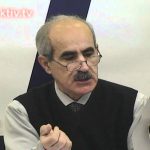By MICHAEL SCHWIRTZ
MOSCOW — Opposition leaders in Azerbaijan vowed Monday to step up a nascent protest campaign against the authoritarian government of the former Soviet republic, despite a recent police crackdown on pro-democracy demonstrators.
Emboldened by protests sweeping the Middle East, government opponents in Azerbaijan, an oil-rich, mostly Muslim country, have taken to Facebook and other social networking sites to organize a series of demonstrations in recent weeks, including one on Saturday, against the government of President Ilham Aliyev.
“There is a criminal, authoritarian and corrupt regime in Azerbaijan, and the people of Azerbaijan no longer want to live under these conditions,” said Isa Gambar, the leader of the opposition party Musavat. “The processes going on internationally, in particular in the Arab countries, have inspired the people to fight for their freedom.”
Mr. Gambar, who spoke by telephone from Azerbaijan’s capital, Baku, said his party would join a confederation of opposition groups at another protest on April 16. The opposition Islamic Party also announced that it would most likely hold its own demonstration this week to coincide with Friday Prayers.
So far, popular support for the protest movement is hard to gauge. Recent demonstrations have drawn several hundred people at most, and have been no match for the columns of riot police sent to disperse them.
At Saturday’s protest near Fountain Square in Baku, the police lashed out at demonstrators with clubs and bare fists, causing several injuries, witnesses said. There were also reports that the police had fired tear gas at demonstrators.
As many as 200 people were detained, according to protest organizers. Most were later released, though at least 20 were sentenced to up to 10 days in prison on various charges. At least 15 opposition leaders were arrested in the days before the protest.
On Monday a Baku court charged four opposition leaders with organizing mass unrest, a crime that carries a maximum sentence of three years.
The authorities have not leveled such serious charges against government opponents in over five years, said Emin Huseynov, the head of the Institute for Reporters’ Freedom and Safety, based in Baku.
“They are afraid of a repeat of what is happening in the Arab countries,” Mr. Huseynov said of the authorities. “These arrests were made to spread total fear.”
Opponents have accused Mr. Aliyev of using Azerbaijan’s vast oil wealth to entrench himself and his family in power. He has ruled since 2003, when he took over the presidency from his father, Heydar. In recent years, opposition journalists and bloggers have been arrested, and political opponents squeezed out of power.
Some observers warned against drawing too many parallels between Azerbaijan and countries like Egypt and Tunisia. Despite his democratic shortcomings, Mr. Aliyev has been credited with ensuring a modicum of stability in a country shaken by war and economic upheaval after the Soviet collapse. He has also maintained warm relations with the West, supplying energy to Europe and a transit route for the American-led military operation in Afghanistan.
Government officials have pointed to the small size of the recent protests as evidence that they lack popular support.
Even so, the recent unrest seems to have persuaded Mr. Aliyev to address some of the protesters’ grievances. Recently the authorities announced an anti-corruption campaign and dismissed several officials accused of graft. Faced with anger recently over rising food prices, Mr. Aliyev personally ordered the price of eggs to be lowered, said Ali Novruzov, a political blogger based in Baku.
“The temperature in Baku is rising,” Mr. Novruzov said by telephone. “Since these protests have begun, there is hope of change.”


